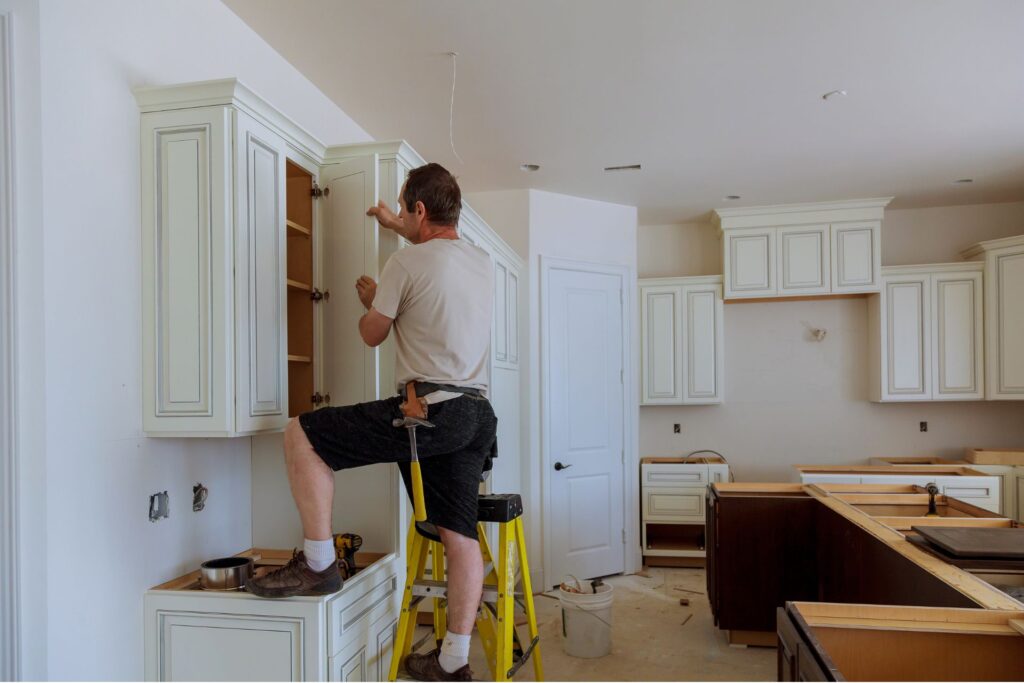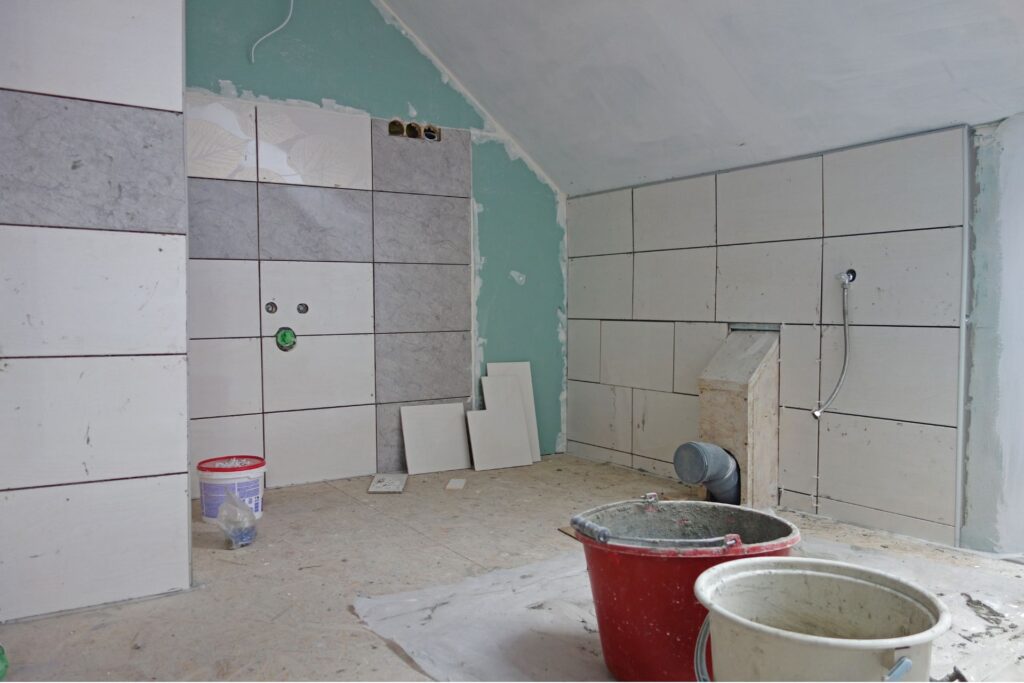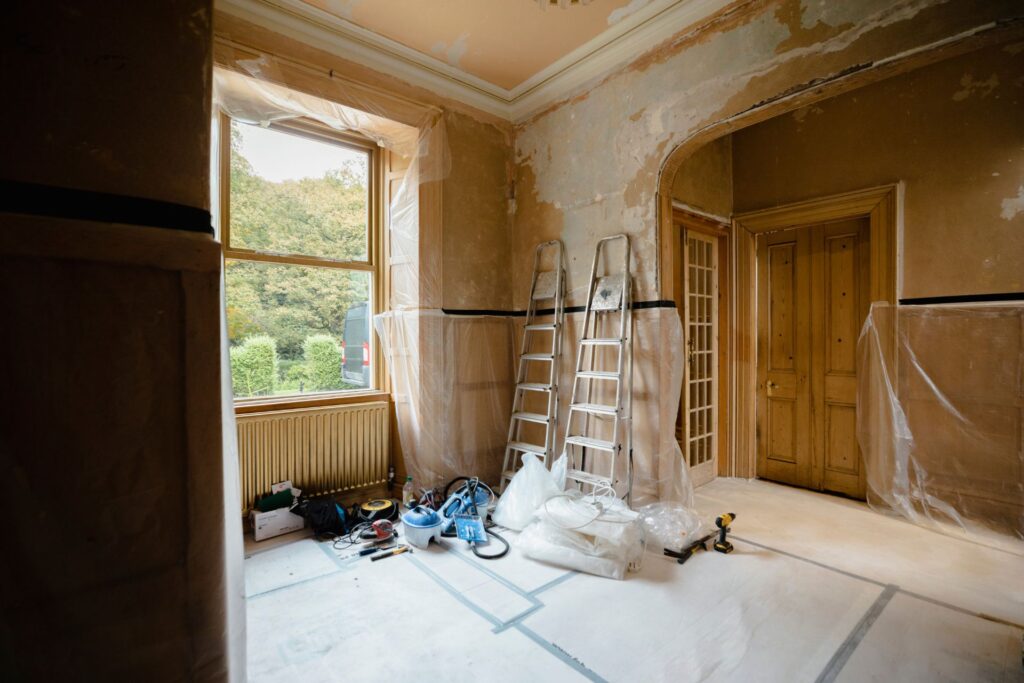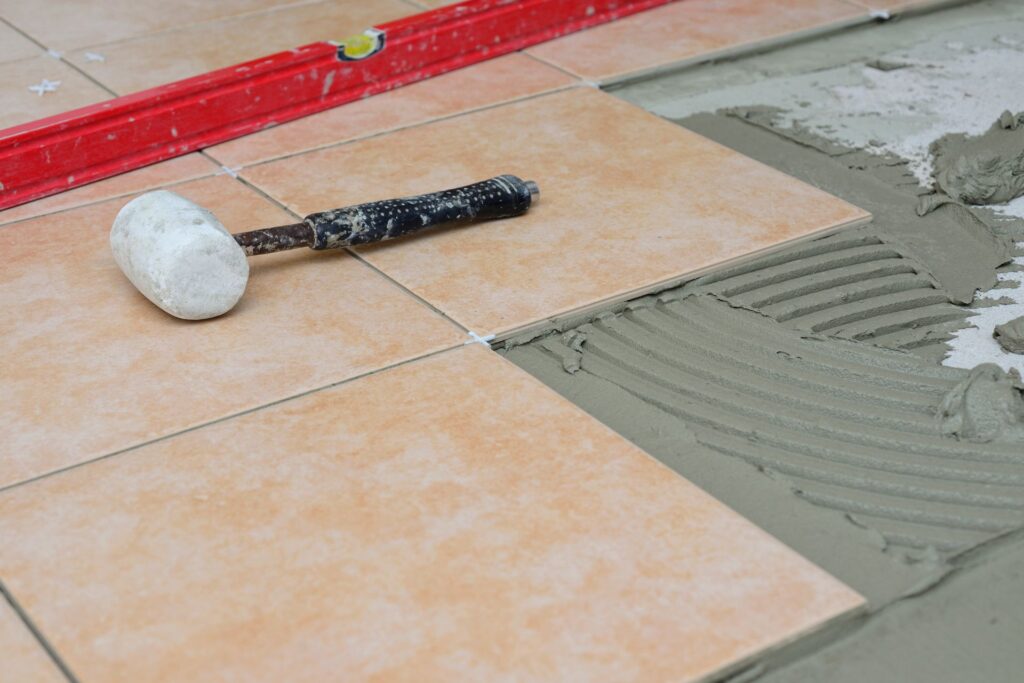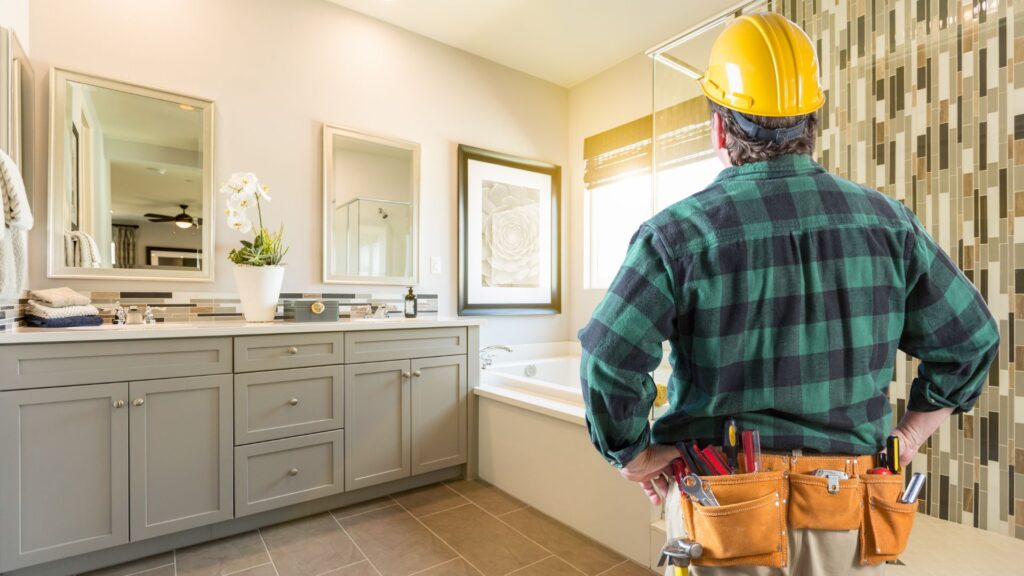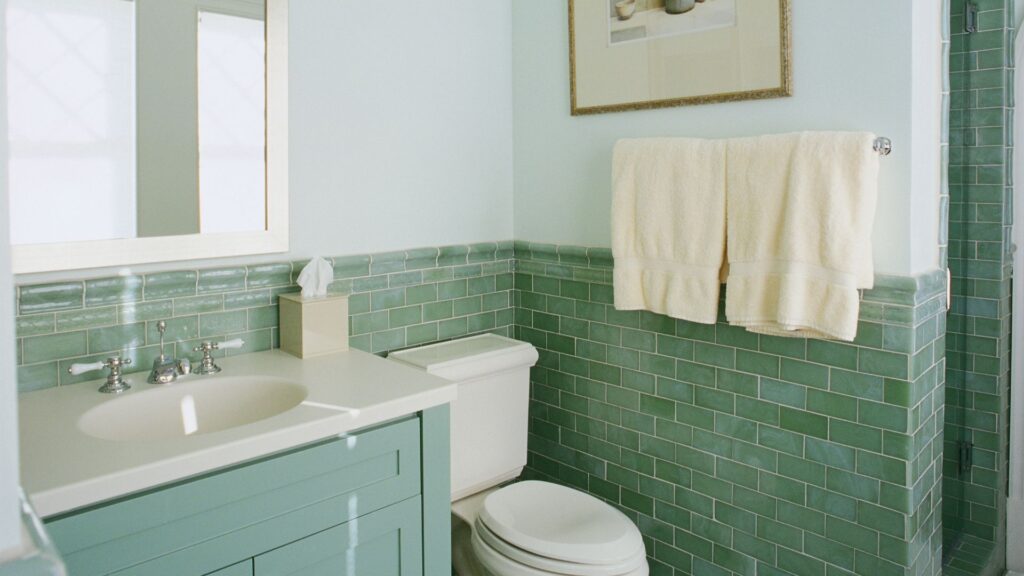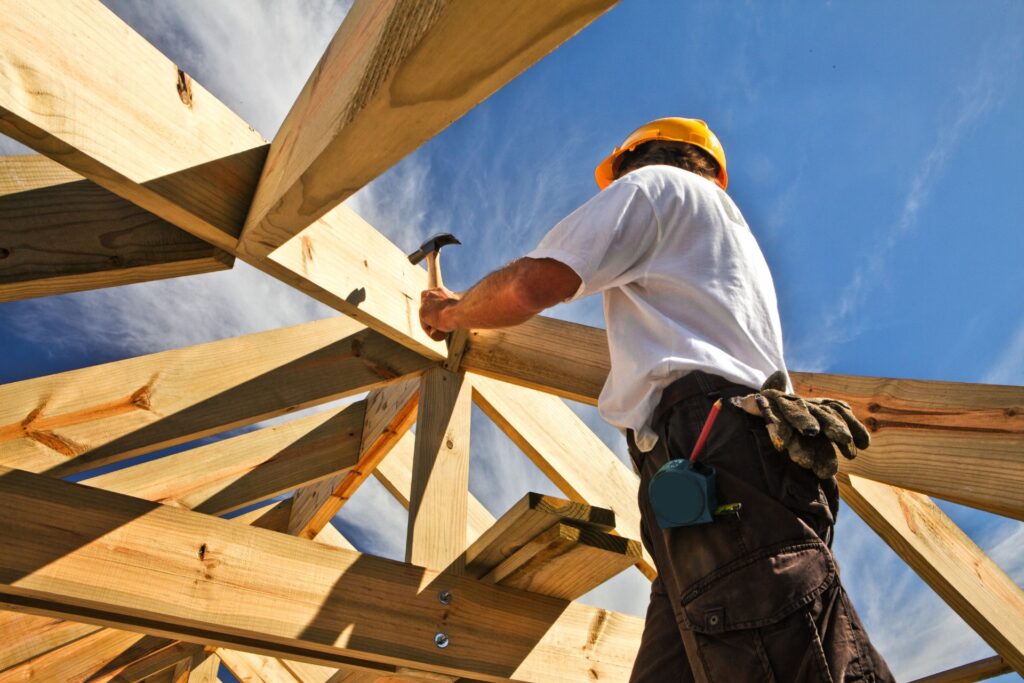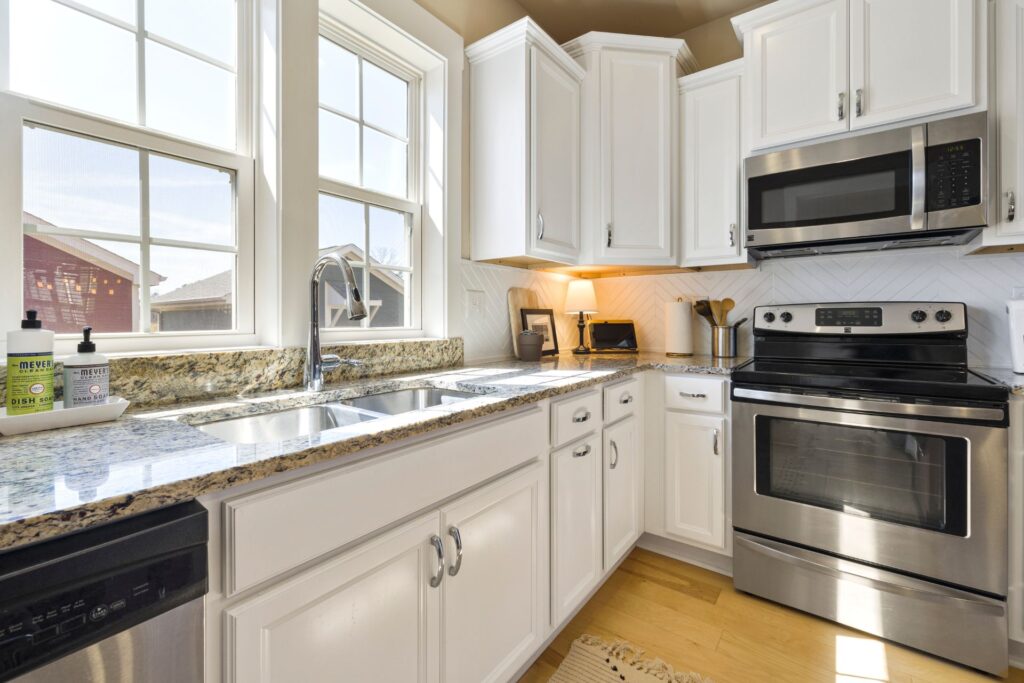Welcome to your ultimate guide on understanding the cost of kitchen renovations in New Zealand! Whether you’re dreaming of a sleek, modern kitchen or simply looking to refresh your current space, knowing the potential costs involved is crucial for planning and budgeting. In this article, we’ll walk you through everything you need to know about kitchen renovation expenses, from average costs and key factors that influence them to hidden costs you should watch out for and tips on how to save money without compromising on quality. Let’s dive in and get you one step closer to your dream kitchen!
On average, the cost of kitchen renovations in New Zealand ranges from $15,000 for a basic upgrade to over $50,000 for a high-end remodel. Factors like the size of the kitchen, choice of materials, and scope of the renovation significantly influence the overall cost. Prioritizing essential upgrades, reusing materials, and obtaining multiple quotes from contractors can help manage expenses effectively.
- Understanding The Average Cost Of Kitchen Renovations In NZ
- Key Factors That Influence Kitchen Renovation Costs
- Hidden Costs To Watch Out For
- Cost-Saving Tips For Kitchen Renovations
- Financing Options For Your Kitchen Renovation
- Saving Up: The Benefits of Saving in Advance to Avoid Debt
- Home Improvement Loans: Overview of Options Like Personal Loans, Home Equity Loans, and Lines of Credit
- Interest-Free Finance Deals: How to Take Advantage of Interest-Free Periods Offered by Some Suppliers and Retailers
- Government Grants or Incentives: Mention Any Local or National Programs That Might Be Available for Energy-Efficient Upgrades
- Real-Life Examples Of Kitchen Renovation Costs In NZ
- How To Choose The Right Kitchen Renovation Contractor
- FAQs: About Cost Of Kitchen Renovations NZ
- Conclusion
Understanding The Average Cost Of Kitchen Renovations In NZ
When it comes to renovating your kitchen in New Zealand, understanding the average costs involved is crucial for planning and budgeting. Whether you’re looking to do a basic upgrade or a full-scale transformation, knowing what to expect financially can help you make informed decisions. This section provides a comprehensive overview of the typical costs associated with kitchen renovations, breaking down expenses by materials, labor, and compliance, while also comparing the different price ranges for budget, mid-range, and high-end projects.
General Cost Range
Kitchen renovations in New Zealand can vary significantly in price, depending on the scope of the project and the quality of materials used. On average, a basic kitchen renovation might start from around $15,000, covering essential updates like new cabinets, countertops, and appliances. For those looking to achieve a more mid-range renovation, the costs can range from $30,000 to $50,000, which typically includes higher-end materials, custom cabinetry, and additional features such as improved lighting and modern appliances. If you’re aiming for a high-end kitchen renovation, the costs can exceed $50,000, with luxury materials, top-of-the-line appliances, and bespoke design elements driving up the price.
Breakdown of Costs
To provide a clearer picture of where your money will go during a kitchen renovation, it’s essential to break down the costs into key components:
- Materials: The cost of materials can be one of the most significant expenses in a kitchen renovation. Items such as cabinets, countertops, flooring, and appliances can vary widely in price based on the quality and brand. For example, laminate countertops are more affordable than granite or quartz, while custom cabinetry will cost more than off-the-shelf options. Flooring choices like vinyl or laminate are cost-effective, whereas hardwood or stone will push your budget higher. On average, materials for a mid-range renovation might cost between $10,000 and $20,000, with high-end options potentially doubling this figure.
- Labor: Hiring skilled professionals is another major cost factor. The expertise of contractors, plumbers, electricians, and tilers is essential to ensure your kitchen is functional and up to code. Labor costs can vary depending on the complexity of the renovation and the rates of the tradespeople in your area. In New Zealand, labor costs for a kitchen renovation can range from $8,000 to $15,000 for a mid-range project. For high-end renovations requiring specialized skills, these costs could be higher.
- Permits and Compliance: Legal requirements such as building consents and compliance certificates are necessary for many kitchen renovations, especially if structural changes are involved. These permits ensure that your renovation meets local building codes and safety standards. The costs for permits and compliance in New Zealand can range from $500 to $2,000, depending on the complexity of the work and the specific regulations in your area.
Comparing Budget, Mid-Range, and High-End Renovations
Understanding the differences between budget, mid-range, and high-end kitchen renovations can help you decide where to allocate your funds:
- Budget Renovations: A budget renovation typically focuses on essential updates and cost-effective materials. You might opt for ready-made cabinets, laminate countertops, and basic appliances. The goal here is functionality and a fresh look without breaking the bank. Expect to spend around $15,000 to $25,000.
- Mid-Range Renovations: A mid-range renovation offers a balance between quality and cost. You’ll have more flexibility to choose higher-quality materials, such as quartz countertops or custom cabinetry, and you may include features like under-cabinet lighting or an upgraded backsplash. Mid-range renovations generally cost between $30,000 and $50,000.
- High-End Renovations: For those seeking a luxury kitchen, a high-end renovation is the way to go. This level of renovation includes top-of-the-line appliances, premium materials like marble countertops, and custom design elements. Every detail is carefully considered to create a high-end aesthetic and functionality. Costs for high-end renovations can exceed $50,000, with no upper limit depending on your preferences.
Understanding these cost factors and what they entail at different levels of renovation can help you plan a kitchen makeover that fits your needs and budget. Whether you’re opting for a budget-friendly refresh or a luxury transformation, knowing what to expect will ensure that your renovation goes smoothly and achieves the desired results.
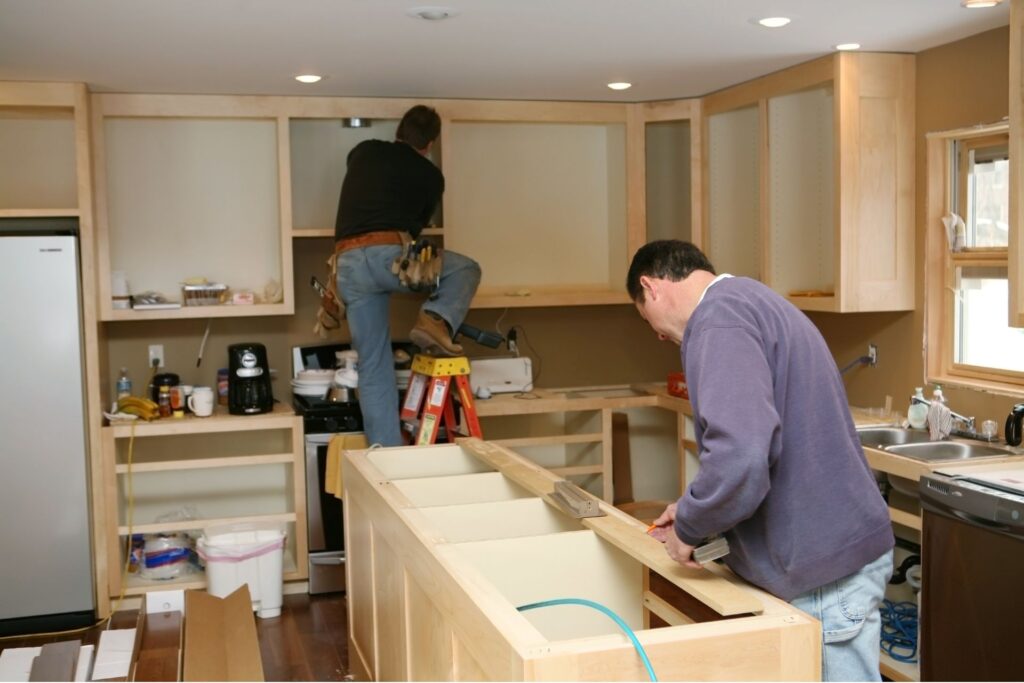
Key Factors That Influence Kitchen Renovation Costs
When planning a kitchen renovation, understanding the key factors that influence costs is crucial for managing your budget effectively. Each kitchen is unique, and the specific circumstances surrounding your project will play a significant role in determining the final price. Below, we explore the primary factors that can impact the cost of your kitchen renovation.
Size and Layout of the Kitchen
The size and layout of your kitchen are fundamental factors that directly affect renovation costs. A larger kitchen typically requires more materials, labor, and time, leading to higher expenses. Additionally, the complexity of the kitchen’s layout—whether it’s an open-plan design, U-shaped, L-shaped, or galley-style—can influence the amount of work needed. For instance, reconfiguring the layout to improve functionality or accommodate new appliances might involve additional costs for plumbing, electrical work, and structural changes. Therefore, when budgeting for your renovation, it’s essential to consider how the size and layout of your kitchen will impact the overall cost.
Choice of Materials
The materials you choose for your kitchen renovation can have a substantial impact on your budget. From countertops to cabinetry and flooring, the range of options is vast, with prices varying accordingly. For example, opting for laminate countertops might be more budget-friendly, whereas choosing high-end materials like granite or quartz can significantly increase costs. Similarly, the choice between solid wood cabinets versus MDF or veneer alternatives can affect your expenses. It’s important to balance aesthetics, durability, and cost when selecting materials, ensuring that your choices align with both your design vision and budget.
Scope of Renovation
The scope of your renovation will greatly influence the final cost. A minor upgrade, such as replacing cabinet doors or updating fixtures, will be considerably less expensive than a complete remodel. A full-scale renovation might involve gutting the existing kitchen, installing new cabinetry, countertops, flooring, lighting, and appliances, and possibly altering the layout or structure. The more extensive the renovation, the higher the labor and material costs will be. It’s crucial to define the scope of your renovation early in the planning process to avoid unexpected costs and ensure that your budget aligns with your goals.
Customization and Design Complexity
Customization and design complexity are significant cost drivers in kitchen renovations. Custom cabinets, unique design features, and other bespoke elements can elevate the look of your kitchen but also come with a higher price tag. Custom-built items require more labor and specialized craftsmanship, which can increase both time and costs. Additionally, intricate designs or the use of premium materials often necessitate specialized installation techniques, further adding to the overall expense. If you’re aiming for a kitchen with personalized features, it’s important to be aware of the additional costs associated with customization and complexity.
Location
Location is another key factor that can influence the cost of your kitchen renovation, particularly within New Zealand. Regional differences in labor and material costs can vary significantly depending on where you live. For instance, renovating a kitchen in a major city like Auckland or Wellington might be more expensive due to higher labor rates and the cost of materials, whereas a renovation in a smaller town or rural area could be more affordable. Additionally, accessibility to suppliers and the cost of transporting materials can also vary by location, further impacting the overall budget. It’s important to research and consider these regional factors when planning your renovation.
In conclusion, understanding these key factors—size and layout, choice of materials, scope of renovation, customization and design complexity, and location—will help you better anticipate the costs associated with your kitchen renovation. By carefully considering each of these elements, you can create a realistic budget that reflects your needs and ensures a successful renovation project.
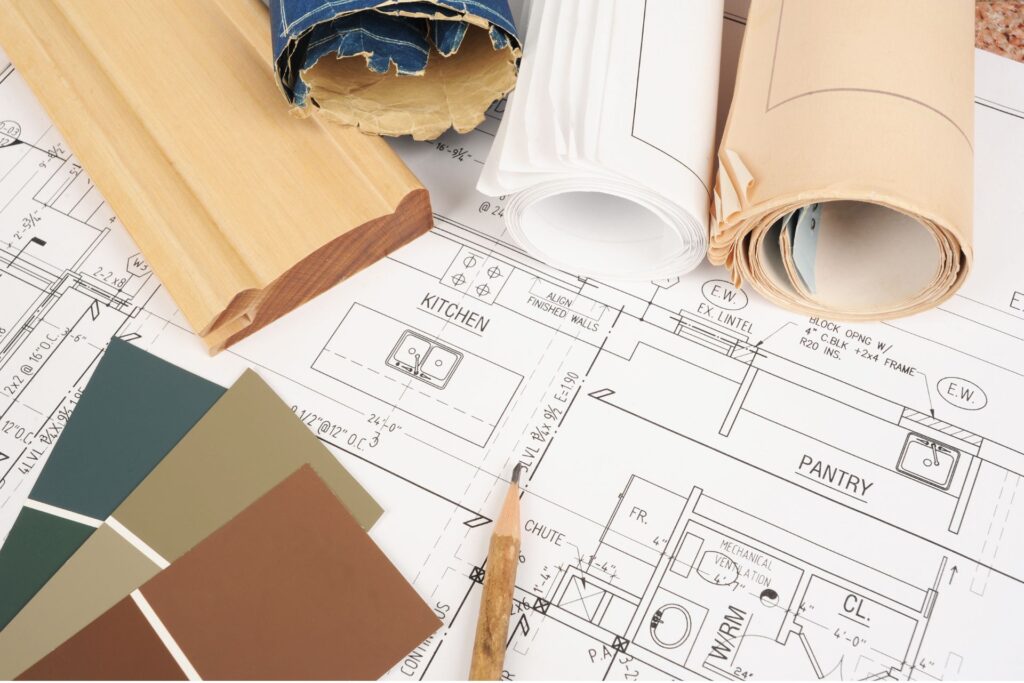
Hidden Costs To Watch Out For
When planning a kitchen renovation, it’s easy to focus on the big-ticket items like cabinets, countertops, and appliances. However, seasoned renovators will tell you that the devil is in the details—or, in this case, the hidden costs. These are the sneaky expenses that can derail your budget if you’re not careful. Let’s take a closer look at some of these potential pitfalls.
Unexpected Structural Issues
One of the most common hidden costs in any renovation project is the discovery of underlying structural issues. You might start with the intention of simply replacing your kitchen’s flooring or cabinetry, only to find that there’s a plumbing leak, outdated wiring, or even mold lurking behind the walls. Addressing these issues is not optional—they must be fixed to ensure the safety and longevity of your new kitchen.
The cost of fixing these problems can vary widely. For example, repairing a simple plumbing issue might set you back a few hundred dollars, but rewiring an entire kitchen could run into the thousands. Unfortunately, these issues often don’t come to light until demolition has begun, meaning they can catch homeowners by surprise. To mitigate this risk, it’s wise to set aside a contingency fund—typically around 10-15% of your overall budget—to cover any unexpected repairs.
Design Changes
Another hidden cost that can sneak up on you is the expense associated with design changes. It’s not uncommon for homeowners to have a change of heart during the renovation process. Maybe you see a new countertop material you love, or you decide to reconfigure the layout to better suit your needs. While these changes might seem minor, they can have a significant impact on your budget.
Design changes often require additional materials, labor, and time, all of which can add up quickly. For instance, if you decide to move a wall or relocate plumbing fixtures, you’re looking at more than just a simple adjustment—these changes could require new permits, structural reinforcements, and specialized labor. To avoid this, try to finalize your design plans as much as possible before the renovation begins. If you do make changes, be prepared for the potential cost implications and discuss them with your contractor to ensure you understand the financial impact.
Waste Disposal
One of the most overlooked hidden costs in a kitchen renovation is waste disposal. When you tear out old cabinets, countertops, and appliances, you’re left with a significant amount of debris that needs to be disposed of properly. Depending on the scope of your project, this could mean anything from hiring a skip bin to paying for specialized disposal of hazardous materials like asbestos or lead paint.
The cost of waste disposal can vary depending on the volume and type of waste, as well as local disposal fees. For example, a skip bin rental can range from $200 to $600, while the disposal of hazardous materials can cost significantly more. To avoid being blindsided by these costs, it’s a good idea to discuss waste disposal options with your contractor ahead of time and include this in your budget.
Time Costs
Finally, one of the most frustrating hidden costs is the cost of time. Renovations rarely go exactly as planned, and delays are almost inevitable. Whether it’s waiting for materials to arrive, dealing with unexpected structural issues, or accommodating changes in design, time can be a costly factor in your renovation.
Delays can increase the overall cost of your renovation in several ways. If your project takes longer than expected, you may need to extend your accommodation arrangements if you’re living elsewhere during the renovation. Additionally, delays can lead to increased labor costs, especially if your contractor has to reschedule other jobs to accommodate your project. To minimize time-related costs, it’s crucial to have a realistic timeline from the start and to build in some flexibility for unexpected delays.
In conclusion, while it’s easy to get excited about the visible changes that come with a kitchen renovation, it’s just as important to be aware of the hidden costs that can creep up on you. By planning for unexpected structural issues, being mindful of design changes, accounting for waste disposal, and anticipating potential time delays, you can better prepare your budget and ensure a smoother renovation process. Remember, the key to a successful renovation is not just about the money you plan to spend, but also about how well you manage the expenses that you didn’t see coming.

Cost-Saving Tips For Kitchen Renovations
Renovating your kitchen is one of the most rewarding home improvements, but it can also be expensive. However, there are effective strategies to manage and reduce costs without sacrificing quality. Here’s how you can save money during your kitchen renovation while ensuring you get the most value out of your investment.
Prioritize What Matters Most
When planning a kitchen renovation, it’s easy to get carried away with all the potential upgrades. However, not every enhancement will deliver the same return on investment. Start by identifying the most critical aspects of your kitchen that truly need attention. For example, upgrading outdated appliances or improving the layout for better functionality should take precedence over purely aesthetic changes. Consider which upgrades will make the most difference in your daily life and which ones will add the most value to your home. This approach helps you allocate your budget effectively, ensuring that you’re spending money on the things that matter most.
DIY vs. Professional Work
The idea of saving money by doing some of the work yourself can be tempting. And in some cases, it’s a smart move. Painting, installing a backsplash, or even assembling cabinetry are tasks that many homeowners can handle with a bit of research and effort. However, it’s crucial to know when to call in the pros. Electrical work, plumbing, and anything involving structural changes are best left to professionals. Attempting these tasks without the necessary expertise can lead to costly mistakes, and in some cases, it may even void your insurance or warranties. The key is to find the right balance—tackle the tasks you’re confident in and leave the complex work to the experts.
Reusing and Recycling
One of the best ways to save money during a kitchen renovation is to repurpose existing materials. If your cabinets are still in good condition, consider giving them a fresh coat of paint or new hardware instead of replacing them entirely. The same goes for appliances—if they’re still functioning well, think about how you can incorporate them into your new design. Reusing materials not only cuts down on costs but is also a more environmentally friendly approach. Additionally, consider shopping at salvage yards or online marketplaces for gently used items that can add character and charm to your kitchen at a fraction of the cost.
Shop Around for Quotes
Getting multiple quotes from contractors and suppliers is one of the most effective ways to ensure you’re getting the best deal. Prices can vary significantly, and by comparing different quotes, you can identify the most cost-effective options without compromising on quality. Don’t be afraid to negotiate—contractors and suppliers often have some flexibility in their pricing, especially if they know they’re competing for your business. Additionally, consider the time of year when planning your renovation; off-peak seasons may offer better deals as contractors look to fill their schedules.
Consider Phased Renovations
If your budget is tight, consider spreading out the renovation work over time. Phased renovations allow you to manage costs more effectively and avoid the financial strain of a large, all-at-once project. Start with the most critical aspects, such as replacing outdated appliances or improving the layout, and gradually work on other elements as your budget allows. This approach also gives you time to live with each phase of the renovation, allowing you to make adjustments as needed before moving on to the next stage. While this method may take longer, it can ultimately lead to a more thoughtful and satisfying result without overwhelming your finances.
In summary, a successful kitchen renovation doesn’t have to break the bank. By prioritizing what matters most, knowing when to DIY, reusing materials, shopping around for quotes, and considering phased renovations, you can achieve a beautiful and functional kitchen that aligns with both your vision and your budget.
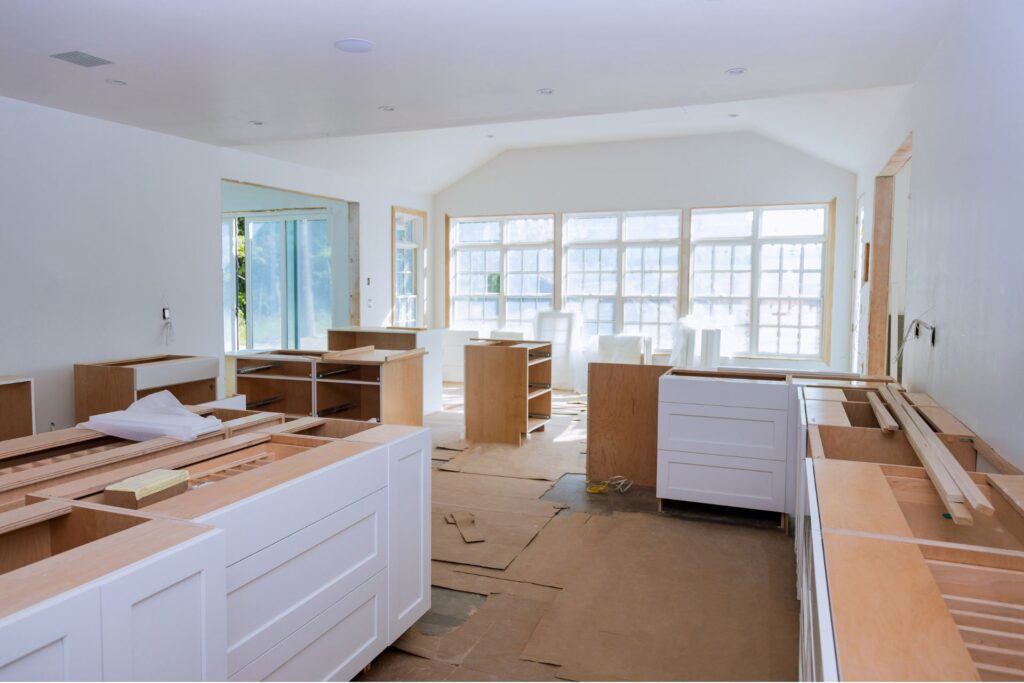
Financing Options For Your Kitchen Renovation
Renovating your kitchen is an exciting venture, but it can also be a significant financial undertaking. Fortunately, there are several financing options available to help you manage the costs effectively. Let’s explore these options, so you can choose the best one that fits your budget and financial situation.
Saving Up: The Benefits of Saving in Advance to Avoid Debt
One of the most prudent ways to finance your kitchen renovation is by saving up in advance. This approach allows you to avoid the burden of debt and the interest charges that come with loans or credit cards. By setting aside money over time, you can approach your renovation with peace of mind, knowing that you’re not overextending your finances.
Saving up also gives you the flexibility to spend on what truly matters to you in the renovation process. Whether it’s high-end appliances, custom cabinetry, or luxury countertops, your choices won’t be limited by loan constraints or interest rates. Additionally, when you pay for your renovation upfront, you’re likely to get better deals from contractors and suppliers, as they often prefer working with clients who can pay immediately. In the long run, saving up for your kitchen renovation is not just a financial strategy; it’s a way to achieve your dream kitchen without the stress of debt hanging over your head.
Home Improvement Loans: Overview of Options Like Personal Loans, Home Equity Loans, and Lines of Credit
If saving up isn’t feasible or you need to get started sooner, home improvement loans offer a viable alternative. These loans come in various forms, each with its own set of benefits and considerations.
- Personal Loans: A personal loan can be a good option if you have a solid credit score and want quick access to funds. Personal loans typically have fixed interest rates and set repayment terms, making it easier to budget for your renovation. However, interest rates can be higher compared to secured loans, so it’s important to shop around for the best deal.
- Home Equity Loans and Lines of Credit (HELOC): If you’ve built up equity in your home, a home equity loan or HELOC can provide you with the funds needed for your kitchen renovation. These loans are secured by your home, so they often come with lower interest rates compared to personal loans. A home equity loan gives you a lump sum, which is ideal for a one-time project like a kitchen renovation. On the other hand, a HELOC acts like a credit card, allowing you to borrow as needed up to a certain limit. This flexibility can be beneficial if your renovation plans evolve over time. However, remember that your home is at stake, so it’s crucial to have a solid repayment plan in place.
Interest-Free Finance Deals: How to Take Advantage of Interest-Free Periods Offered by Some Suppliers and Retailers
Many suppliers and retailers offer interest-free finance deals, which can be an excellent way to spread the cost of your kitchen renovation without incurring interest charges. These deals typically involve making regular payments over a set period, such as 6, 12, or 24 months, without paying any interest.
To take full advantage of these offers, it’s important to read the fine print and understand the terms. Make sure you can afford the monthly payments and that you’ll be able to pay off the balance within the interest-free period. If you fail to do so, you could be hit with high interest rates retroactively applied from the start of the loan. Additionally, some deals may require a deposit or have minimum purchase requirements, so factor these into your budgeting.
When used wisely, interest-free finance deals can be a smart way to finance your kitchen renovation, especially if you’re able to secure one from a reputable supplier offering quality products and services.
Government Grants or Incentives: Mention Any Local or National Programs That Might Be Available for Energy-Efficient Upgrades
In some regions, government grants or incentives are available to encourage homeowners to make energy-efficient upgrades during their renovations. These programs can significantly offset the cost of your kitchen renovation, especially if you’re planning to install energy-efficient appliances, windows, or insulation.
Check with your local or national government to see if you qualify for any of these programs. In some cases, you may need to meet specific criteria, such as using certified products or hiring licensed contractors. Additionally, some programs may offer rebates after the renovation is completed, while others might provide upfront discounts.
Taking advantage of these incentives not only helps reduce your renovation costs but also contributes to long-term savings on your energy bills. Plus, by making energy-efficient choices, you’re doing your part to reduce your environmental footprint, which is an added bonus.
By exploring and carefully considering these financing options, you can plan a kitchen renovation that suits your budget and financial situation. Whether you choose to save up, take out a loan, utilize interest-free deals, or apply for government incentives, there’s a solution that can help you achieve your dream kitchen without unnecessary financial stress.
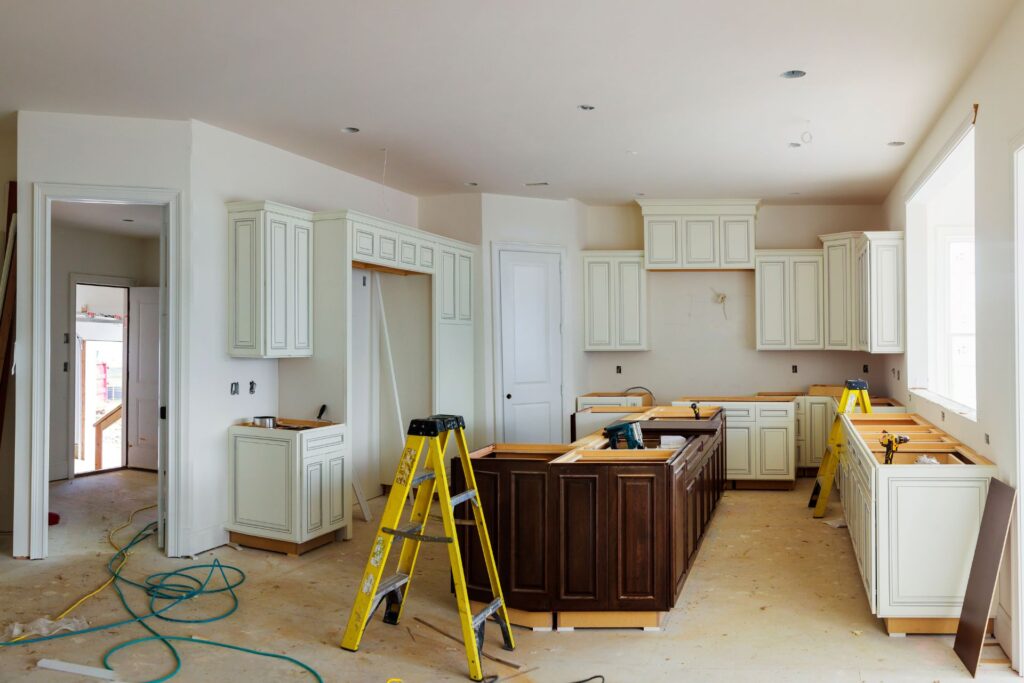
Real-Life Examples Of Kitchen Renovation Costs In NZ
When it comes to renovating your kitchen, understanding the potential costs involved is crucial. Whether you’re on a tight budget or ready to invest in a high-end remodel, knowing what to expect can help you plan and prioritize effectively. Here, we’ll explore three different levels of kitchen renovations in New Zealand—budget, mid-range, and high-end—each illustrating what you can achieve at various price points. Additionally, we’ll touch on real-life case studies or testimonials to provide a clearer picture of the experiences of homeowners who have undergone these transformations.
Budget Renovation Example
A budget kitchen renovation is all about making smart choices to keep costs down while still achieving a functional and fresh new look. For example, let’s consider a renovation project in Auckland where the homeowners had a budget of around $15,000. They opted for refacing the existing cabinets instead of replacing them, saving a significant amount of money. The benchtops were upgraded to laminate, a cost-effective yet durable option, and the flooring was updated with vinyl, which offers a sleek appearance at a fraction of the cost of hardwood.
Appliances were selected from mid-range brands, focusing on energy efficiency without the hefty price tag of high-end models. The homeowners also chose to repaint the walls themselves, a DIY effort that added a personal touch while reducing labor costs. Despite the modest budget, the end result was a bright, modern kitchen that met all their functional needs without breaking the bank.
Mid-Range Renovation Example
Moving into the mid-range category, let’s take a look at a renovation project that cost approximately $40,000. This level of renovation often includes a mix of budget-friendly and premium elements, striking a balance between quality and cost. For instance, a Wellington couple decided to update their 1980s kitchen with a more contemporary design. They invested in custom cabinetry with soft-close hinges and upgraded to quartz benchtops, which provided a durable and attractive surface without the expense of natural stone.
The couple also splurged on a stylish tile backsplash, adding a focal point to the room, and chose mid-tier appliances that offered advanced features without the premium price tag. Lighting was another area where they invested a bit more, opting for a combination of recessed ceiling lights and under-cabinet lighting to create a warm, inviting atmosphere. This mid-range renovation resulted in a kitchen that feels luxurious without crossing into the high-end price range.
High-End Renovation Example
For those with a larger budget, a high-end kitchen renovation can transform a space into something truly spectacular. Consider a recent project in Christchurch where the homeowners spent over $100,000 to achieve their dream kitchen. This renovation included custom-made cabinetry from top-tier materials, marble benchtops, and state-of-the-art appliances, including a built-in coffee machine and wine fridge.
The flooring was upgraded to natural hardwood, and the walls were adorned with bespoke tiles imported from Italy. Special features like a large kitchen island with seating, pendant lighting, and a butler’s pantry added both functionality and a sense of luxury to the space. The homeowners also incorporated smart home technology, allowing them to control lighting, temperature, and appliances through their smartphones. This high-end renovation not only enhanced the kitchen’s aesthetic appeal but also significantly increased the home’s overall value.
Case Studies or Testimonials
Real-life experiences from homeowners who have gone through the renovation process can offer invaluable insights. For instance, one homeowner in Tauranga who completed a mid-range renovation shared that the key to staying within budget was careful planning and prioritizing the most important elements of the kitchen. They emphasized the importance of getting multiple quotes and being flexible with materials and finishes to find the best deals.
Another case study from a couple in Dunedin, who undertook a high-end renovation, highlighted the importance of working with a skilled designer to bring their vision to life. They noted that while the process was more time-consuming and expensive than anticipated, the final result was worth the investment, as their kitchen became the heart of their home, perfect for entertaining guests.
These examples and testimonials provide a snapshot of what to expect when renovating a kitchen in New Zealand, helping you to plan your project with confidence, regardless of your budget. Whether you’re looking to make modest updates or create a luxurious culinary space, understanding the costs and potential outcomes is the first step toward achieving the kitchen of your dreams.
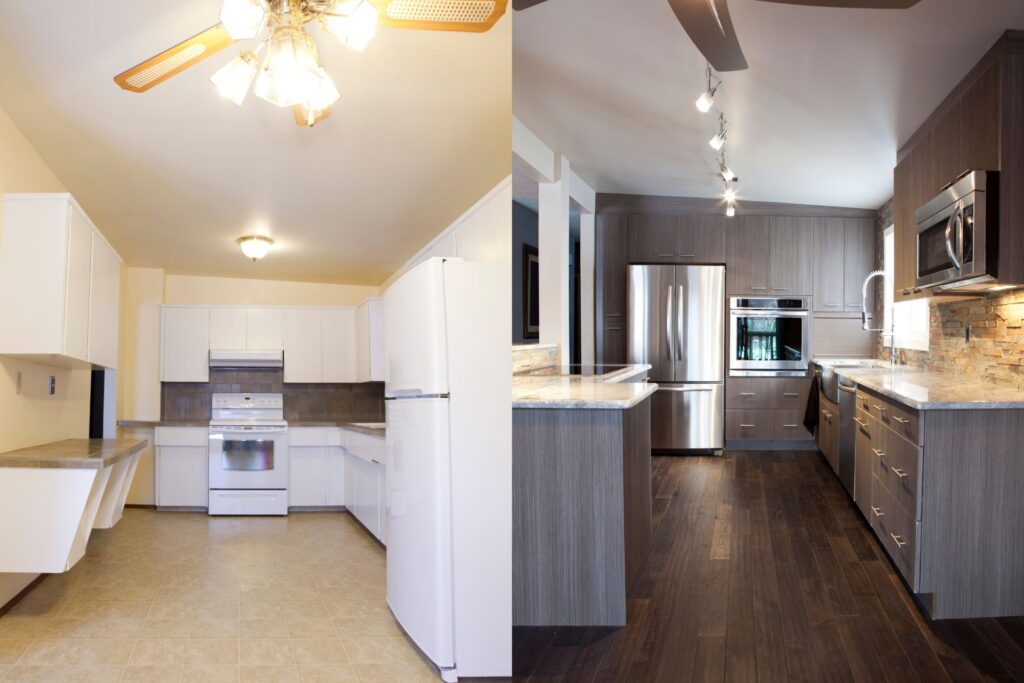
How To Choose The Right Kitchen Renovation Contractor
Renovating your kitchen is a significant investment, and choosing the right contractor is crucial to ensuring the process goes smoothly and the final result meets your expectations. Here’s a comprehensive guide to help you select the best kitchen renovation contractor, focusing on essential factors like research, credentials, quotes, and communication.
Research and Referrals
The first step in finding the right contractor is thorough research. Start by asking friends, family, or neighbors who have recently renovated their kitchens for recommendations. Personal referrals often provide the most trustworthy insights, as you can see the results firsthand and hear about their experiences.
In addition to referrals, use online resources to expand your list of potential contractors. Websites like Houzz, Angie’s List, or Google Reviews can offer valuable feedback from previous clients. Pay attention to the overall ratings and specific comments about timeliness, quality of work, and customer service. Look for contractors with consistently high reviews and a portfolio that matches the style and scope of your kitchen renovation project.
Check Credentials and Experience
Once you have a shortlist of potential contractors, it’s essential to verify their credentials and experience. A reputable contractor should have all the necessary licenses and certifications required in your area. These credentials ensure that the contractor is qualified to perform the work and adheres to local building codes and regulations.
Experience is another critical factor. Ask about the contractor’s experience with kitchen renovations specifically. A contractor with a solid track record in kitchen remodeling is more likely to anticipate challenges and deliver a high-quality result. Request to see a portfolio of their previous work, particularly projects similar to yours. This will give you a clear idea of their craftsmanship and attention to detail.
Get Detailed Quotes
Obtaining detailed quotes from multiple contractors is crucial to making an informed decision. A comprehensive quote should break down the costs for materials, labor, and any other expenses, such as permits or waste disposal. Be wary of quotes that are significantly lower than others, as they may indicate shortcuts or hidden costs that could arise later in the project.
When reviewing quotes, pay attention to the level of detail provided. A transparent contractor will be clear about what is included and what is not, helping you avoid any surprises down the line. This is also an excellent opportunity to assess the contractor’s professionalism and willingness to answer your questions. If a contractor is vague or dismissive, it might be a red flag.
Communication and Trust
Effective communication is key to a successful kitchen renovation. From the initial consultation, you should feel comfortable discussing your ideas, concerns, and budget with the contractor. A good contractor will listen carefully, offer suggestions, and be upfront about what is achievable within your budget and timeline.
Trust is another critical component of the contractor-client relationship. You’ll be working closely with this person or team for weeks, if not months, so it’s vital to choose someone you feel confident in. Look for a contractor who is not only skilled but also reliable, honest, and respectful of your home and time.
To build this trust, consider setting up a few face-to-face meetings before signing a contract. These meetings can give you a better sense of the contractor’s personality, work ethic, and how they handle potential challenges. Additionally, ask for references from past clients and follow up with them to get a sense of what it’s like to work with the contractor.
In conclusion, choosing the right kitchen renovation contractor requires careful research, checking credentials, obtaining detailed quotes, and establishing a strong working relationship based on communication and trust. By taking the time to find a contractor who meets these criteria, you’ll be well on your way to achieving the kitchen of your dreams.

FAQs: About Cost Of Kitchen Renovations NZ
A basic kitchen renovation in New Zealand typically costs between $15,000 and $25,000. This range includes budget-friendly materials and standard appliances, with minimal structural changes or custom features.
The most significant factors affecting kitchen renovation costs include the size and layout of the kitchen, choice of materials (e.g., countertops, cabinets), the scope of the renovation (minor vs. major), and the complexity of the design. Location within New Zealand can also influence labor and material costs.
Generally, smaller kitchens are less expensive to renovate because they require fewer materials and less labor. However, if a small kitchen has complex design features or high-end materials, the cost per square meter may be higher than in a larger kitchen.
You can save money on your kitchen renovation by prioritizing essential upgrades, reusing existing materials where possible, shopping around for quotes, opting for mid-range instead of high-end materials, and doing some of the work yourself (like painting or demolition).
A kitchen renovation in New Zealand typically takes between 4 to 8 weeks, depending on the scope of the work. This includes time for planning, demolition, construction, and installation. Delays can occur due to unforeseen structural issues or waiting for materials.
In most cases, you don’t need a building consent for a kitchen renovation if you’re not making structural changes. However, if your renovation involves altering plumbing, electrical work, or making significant structural changes, you may need consent. It’s best to check with your local council.
Yes, you can live in your home during a kitchen renovation, though it may be inconvenient. Setting up a temporary kitchen in another area of your home and planning meals in advance can help manage the disruption. For extensive renovations, you might consider staying elsewhere temporarily.
Investing in high-end kitchen appliances can be worth it if you prioritize energy efficiency, durability, and advanced features. High-end appliances can also add value to your home. However, for those on a tighter budget, mid-range appliances can offer a good balance between cost and quality.
The most popular kitchen styles in New Zealand include modern, minimalist designs with clean lines and neutral colors, as well as rustic or farmhouse styles that incorporate natural materials like wood and stone. Coastal-themed kitchens are also common, reflecting New Zealand’s beach culture.
To choose the right contractor for your kitchen renovation, start by asking for recommendations from friends and family, checking online reviews, and verifying credentials. Get detailed quotes from multiple contractors and ask for references from past clients. Clear communication and a good rapport with the contractor are essential for a successful renovation.
Conclusion
In conclusion, renovating a kitchen is a significant investment that requires careful planning and consideration. From understanding the typical cost breakdown to exploring various financing options and considering cost-saving tips, this guide has covered all the essential aspects to help you make informed decisions. Remember, whether you’re opting for a budget-friendly update or a high-end transformation, the key is to prioritize what matters most to you and seek professional advice where needed. If you’re ready to take the next step, don’t hesitate to contact a local contractor for a personalized quote. We encourage you to share your renovation experiences or ask any questions in the comments below—your insights could help others in their journey toward creating their dream kitchen.
About the Author:
Mike Veail is a recognized digital marketing expert with over 6 years of experience in helping tradespeople and small businesses thrive online. A former quantity surveyor, Mike combines deep industry knowledge with hands-on expertise in SEO and Google Ads. His marketing strategies are tailored to the specific needs of the trades sector, helping businesses increase visibility and generate more leads through proven, ethical methods.
Mike has successfully partnered with numerous companies, establishing a track record of delivering measurable results. His work has been featured across various platforms that showcase his expertise in lead generation and online marketing for the trades sector.
Learn more about Mike's experience and services at https://theleadguy.online or follow him on social media:
